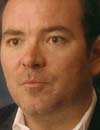- Jeff Jarvis
Blogger, BuzzMachine - Josh Marshall
Blogger, Talking Points Memo - Markos Moulitsas
Blogger, Daily Kos
We're seeing the beginnings of it, and I would hope his response would have been, how can I find ways to do more of it with them? But I'll give you one little example. There's a coalition -- right, left, libertarian -- of bloggers who don't like pork [in the government], and they started something called Porkbusters. With other organizations of bloggers, they saw that there was an accountability bill in the Senate that would have put up spending bills online that were being blocked by a secret hold. So they said to the bloggers: "OK, all of you call your senators' offices and find out whether they're the ones putting the hold on it. Ask them to say on the record whether they are not." ... At the end, there were two senators who put the hold on who had to admit -- Senators [Ted] Stevens [R-Alaska] and Robert Byrd [D-W.Va.]. So they admit it in public; the hold went off; the bill was passed. We now have accountability of that spending legislation on the Internet. I say that's an act of journalism.
Could be an act of political organizing also.
Yes, it could be. Well, when the newspaper decides what to report, there's an act of advocacy there. They chose to say that's a priority and that's not, so it's the same thing. The line between advocacy and journalism has always been close, closer than we admitted in professional journalism, and it's close here, too. ...
Not if you say, "I go wherever the facts take me," and I'm not starting out with a presumption that pork is bad, in your example.
Oh, whoa, whoa, whoa, whoa, whoa. Come on, Lowell, come on. In any big news organization, you say, "Let's go find that government waste." ... 60 Minutes, FRONTLINE, you choose to go after stories because there's a reason to go after that story, and the decision of that reason is a decision of advocacy. It's not a decision [made] out of some objectivity. ...
You said that [in] your reporting on Social Security, you veered into political activism.
Uh-huh. Yeah.
You abandoned journalism.
No, I don't think I abandoned journalism.
You didn't just become a propagandist?
No, I don't think I did.
Why? You hated the Social Security program, right? You thought it was bad. ...
Yeah, yeah. But I don't think that makes me a propagandist. I think the difference is that I got more involved. ...
I started focusing in on certain members of Congress, particularly Democrats, who were not willing to come out with a specific position on this question, and I focused people's attention on those. So in an indirect way, it was a way of organizing opposition to what the president was doing.
Didn't you send your readers out to poll Congress when there was a voice vote?
That was with what we call the DeLay Rule, which was this rule the GOP House Caucus passed to basically allow Tom DeLay to stay as majority leader even if he got indicted.
Right.
Yeah, yeah. Because I think, again, that was a case where members of Congress had an advantage, because no one was making them say where they stood.
Because they could do a voice vote, and there was no record.
They could do a voice vote, and there was no record. And no one quite had the time to go out and ask these members of Congress individually, "Where did you vote?" They would come up with some excuse or something like that. What I thought was that having their constituents ask them, "You represent me; what did you do?," was a way of bringing the truth out, of finding out where people stood.
Embarrassing them.
I think where they stood probably, in many cases, did embarrass them. But I wanted to find out where they stood.
And you took the word of your readers who reported back to you?
No. What we did was readers went; they called; they asked; they got letters and stuff like that. We got that information back, and based on that, we would go out and confirm it. Some cases, we actually got the letters that members of Congress sent. So no, we didn't just take their word for it. We had various ways of confirming what these members of Congress said.
So you were taking tips or advanced research from your audience and then fact checking it afterward.
Yes. ... This was kind of a hybrid, where if a journalist calls up a member of the House of Representatives and says, "Where did you vote on this DeLay thing?," they can just say, "We're not answering that question." If 100 constituents call that member of Congress and say, "I want to know where you stood on this question," they're far less likely to stonewall them, because they know that their constituents are interested. Once they start answering their constituents and say, "Yeah, we voted in favor of that," and we find that out, we can follow up and say, "Hey, you're telling your constituents you voted for this. Is that true?" ...
You're more than a political writer. An activist?
Yeah, there's definitely an activist component. It's hard to pigeonhole what I do. Traditionally it was easier for people to find the niche because the media landscape and the political landscape really forced people into their niches, right? You were either an activist or you were a writer or you were a pundit, or XYZ.
We're all of the above. I do original reporting, so I can wear a reporter's hat; I can wear a journalist's hat. I do activist type work -- raise money, urge people to turn out for certain campaigns, encourage them to call their congressmen and senators on certain issues -- so I have that role. Obviously a pundit as well, since I'm pontificating on certain issues. An analyst, because I'm poring over voter registration numbers and poll numbers and trying to see what the impact will be on certain races. So I wear all those hats, and one of many beauties of what I'm doing -- of [the] citizen media, blogging world -- is nobody's going to tell me what I can or cannot do. I can do whatever I want, and if tomorrow I want to write a poem and be a poet, then tomorrow I'll write a poem and be a poet. Nobody can tell me I can or can't do that.
That's very liberating, and it's very exciting. It's one reason people have really taken to this medium, because they don't like to be told what they can or cannot do, and here's a medium that really accommodates that.
![News War [site home page]](../art/p_title.gif)










